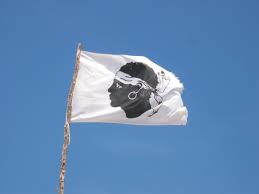24 March 2022
Autonomy or Independence
Corsica, Catalonia, Western Sahara
By Neil Tidmarsh

Sovereignty, freedom, independence… These troublesome and (often literally) incendiary words were difficult to avoid in this week’s headlines, even where Ukraine wasn’t the subject. Should the island of Corsica be independent from France? Should Catalonia be independent from Spain? Should the Western Sahara be independent from Morocco? Questions which have been slumbering for years, decades or even centuries are showing signs of stirring into wakefulness again.
While President Macron, during a three-hour news conference in Aubervilliers, was promising to “make France a more independent nation” if he was elected for a second term, protesters elsewhere in France were demanding independence from France itself. In Corsica, violent protests and rioting have left more than 100 people injured (including 77 police officers) in recent weeks. The immediate cause of the riots was a violent attack on an imprisoned Corsican nationalist hero and convicted murderer, Yvan Colonna, by a fellow inmate (the prison was in Arles, on the mainland – Corsican nationalists have always insisted that he should have been imprisoned in Borgo jail on the island itself for his own safety); but the thousands of protesters who marched and then rioted were quick to take up the old Corsican nationalist cry of “Liberta!”
Corsica was annexed by France in 1768. For the last two hundred and fifty years, Corsican nationalist sentiment has regularly flared up into anti-French violence. The bullets and bombs of separatist groups such as the Corsica National Liberation Front (FNLC) killed dozens of people and destroyed property in the 1970’s, 1980’s and 1990’s. In Ajaccio in 1998, Yvan Colonna was one of a gang of separatists who shot dead Claude Erignac, the French official appointed by Paris as the island’s regional prefect. The FNLC renounced violence in 2014 but has threatened to resume the armed struggle following the attack on Yvan Colonna (who died of his injuries earlier this week).
Throughout French history, governments in Paris have shown little tolerance for regional diversity. Local assemblies were abolished and local languages and dialects were suppressed in a long and systematic campaign to impose a uniform national culture and a single political authority across the whole country, centralised in the capital. Since the 1990’s, however, Corsica has had a regional assembly and has more of a say in its own affairs than most other regions, but its executive powers are still pretty limited.
Nationalists dominate the island council. Most of the councillors, and a majority of the island’s 350,000 inhabitants, are moderate nationalists, seeking a degree of autonomy for Corsica, with Paris devolving power over health, education, taxation and the economy, and recognising Corsican as an official language equal to French. They point out that these powers are no more than those enjoyed by other Mediterranean islands belonging to other European countries, such as Italy’s Sardinia or Spain’s Balearics (only this week, for instance, the Balearics’ parliament proposed banning or at least restricting the sale of property on the islands to foreigners, something which Corsica – where 40% of property is holiday homes – has been requesting for years). They recognise that complete independence is unrealistic (the island is economically weak and supported by subsidies from Paris), but that hasn’t prevented other, hard-core nationalists – 16% of the population, represented by separatist groups such as the FNLC and ‘Corre in Fronte’ – from demanding full independence and insisting on a complete break with France.
In the wake of the riots, President Macron has sent the interior minister Gérald Darmanin to Ajaccio, with the astonishing message that Paris would consider granting the island a degree of autonomy. “We are ready to go as far as autonomy” M Darmanin admitted to the Corsican press. “There you go, the word has been said.” He and the island’s council are about to embark on talks which should run for the rest of the year.
The Paris government insists that Corsica will “remain a part of the Republic” and that it will “never accept that there are two categories of people in the Republic”, but President Macron’s initiative is nevertheless truly historic. He has inevitably come under fire from his political opponents for breaking this long-standing and traditionally French taboo. In particular, his three main presidential rivals from the right wing – the National Rally’s Marine Le Pen, the Republican’s Valérie Pécresse, and Éric Zemmour – have accused him of caving in to rioters, of undermining France’s ‘unitary state’ and of setting a dangerous example for Bretons, Basques and other citizens of France who would like their own regional differences to be given ‘special treatment’ too.
Macron could perhaps take some comfort from Spain, where an opinion poll undertaken by Catalonia’s regional government (which enjoys the kind of autonomy that Corsica will no doubt be seeking in negotiations with M Darmanin) revealed this week that a majority of Catalans now oppose full independence. Of those polled, 53% were against a complete break from Spain, while only 38.8% were in favour of it. Only a year ago, a similar poll reported that 48.7% were against independence and 44.9% supported it. Five years on from the illegal referendum and the failed declaration of independence, it looks as if the Catalan separatist movement has run out of steam. Pedro Sanchez, Spain’s Socialist prime minister, has done much to calm the situation and avoid confrontation (his minority government depends on support from Catalan nationalist parties) since he came to power in 2018. “The independence movement grows with confrontation” said Oriol Bartomeus, a professor of politics at a Barcelona university, quoted in The Times this week. “Sánchez’s strategy, with a much softer reaction, removes some of the independence movement’s arguments and weakens it.”
(Mr Sanchez nevertheless did find another “independence or autonomy” headache landing on his desk this week. Since Spain’s occupation of the Western Sahara collapsed in 1975 on the death of Franco, the region has been claimed by Morocco, in spite of the population’s struggle to establish an independent state for themselves. This week the Spanish government, which has always been neutral in spite of widespread support in Spain for the people of Western Sahara and their fight for independence from Morocco, backed a proposal by Morocco to grant Western Sahara a degree of autonomy. Morocco is opposed by its neighbour Algeria, which supports the cause of a separate and independent West Sahara and is now threatening to cut off gas supplies to Spain…)
Spain is one of the least centralised countries in Europe; granting a great deal of autonomy to its regions came with the country’s emergence as a modern democratic European nation almost fifty years ago, and was a liberal corrective to Franco’s ruthless suppression of regional challenges to Madrid’s authority and to its Castilian culture and language. France is the most centralised country in Europe; President Macron’s hint that he might be prepared to take a leaf out of Spain’s constitution is one more sign that he’s attempting to move his country in the right direction, and he is to be applauded for it.


